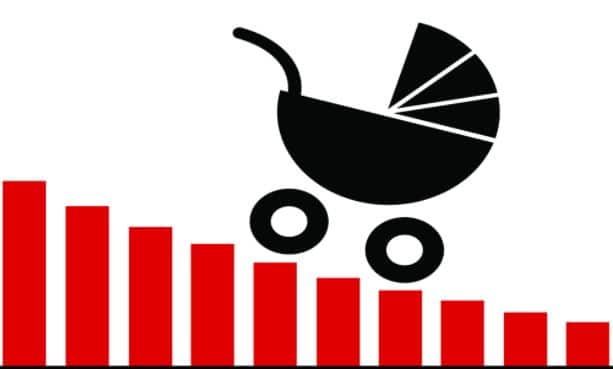The COVID Baby Bust: How the Pandemic has Affected Private Adoption

Rene Haslnik from Adoption Miracles in Tampa, FL has spent over a decade connecting women facing unplanned pregnancies with couples looking to support a birth mom and adopt the child. She has always felt that her mission was to support life and help make families. “I’ve never been a big agency. I never wanted that. One or two placements a month was enough.” She said.
But for months the phone calls, emails, and text messages from young women facing unplanned pregnancies have all but vanished. In the meantime, desperate calls from families hoping to adopt have increased. “The number of families wanting to adopt has always been higher than the number of girls willing to carry a baby to term and place them for adoption, but this is unprecedented.” Said, Haslnik. “I’ve spoken to many other agencies, and we are all at a loss. The number of birth moms has plummeted.”
When COVID hit, many people assumed that couples, stuck inside together for months at a time would lead to the “COVID Baby Boom”. After all, what else was there to do but procreate?
However, as the lockdown spread around the world and weeks turned into months, gynecologists were the first to notice that there were no surges of pregnant women walking through their doors. In fact, fewer women were walking through their doors than before COVID.
By December 2020, nine months after the lockdowns began in March, provisional birth rate data provided to CBS New by 29 state health departments showed a roughly 7.3% decline in births. California, the most populous state, reported a 10.2% decline, falling to 32,910 births in December from 36,651 the year prior. In the same time frame, births declined by 30.4% in Hawaii. While birthrates have been falling for 10 years, this could be the largest decline since the baby boom began to quiet in the mid-1960s.
It is not just birth rates that have fallen. Google Trends showed significant decline in searches involving pregnancy both planned and unplanned. Meanwhile surveys showed a sharp incline in women choosing to delay conceiving and women claiming to be much more careful and consistent with forms of pregnancy prevention.
By January of 2021, experts across the board had to admit that not only was there no COVID Baby Boom, but that we are actually facing a Baby Bust that has led to fewer births last year in the United States and could mean 300,000 fewer babies born this year with effects stretching out for years.
The Guttmacker Institute found that 34% of American women have reduced the number of children they expect to have or delayed their plans to have children due to the pandemic. This trend is also seen around the world with Italy, France, Germany, Spain, and the UK all reporting decreases in birth rates, some decreases are the sharpest on record.
These numbers all make sense in light of couples who feel uncertain about their financial futures. But it is rarely couples who choose to give a baby up for adoption. It is usually young, un-wed mothers who find themselves in a situation where they are pregnant but know that they are not capable of caring for a child. A small percentage of those women choose to become ‘birth moms’ who will carry the baby to term, birth the child, and turn the baby over to be adopted by a family of their choice. Through private adoption agencies like Adoption Miracles these birth moms are given assistance with living expenses, transportation, free counseling, and a support system aimed at helping them move forward into a bright future after the birth.
The circumstances that can lead to an unplanned pregnancy are vast, but most occur to young women through social engagements. During COVID, social engagements significantly slowed, and so did the number unplanned pregnancies.
“I used to get 10 phone calls a month from perspective birth moms. Now, I’m excited if I get 1 or 2.” Haslnik said.
Across the globe adoption agencies are reporting a 50% or more decrease in available birth moms which is creating huge waiting lists for families looking to support a birth mom and adopt an infant. Many agencies have waiting lists of over 250 family hopefuls, and several have stopped adding names to their waiting lists citing that with current birth mom rates, it will take them 3 or more years to find birth moms for the families already on their waiting lists.
For small agencies like Adoption Miracles, a decrease of 50% means less than 6 placements a year which makes it hard to survive as a business.
“This business is my heart.” Said, Haslnik. “I don’t do it to get rich. I do it because private adoption creates something miraculous for every person involved. The birth mom gets support and care that she never imagined possible. The baby gets a chance to live, love, and laugh. And the parents get to have a family. Something that they could never achieve on their own.”
The post COVID private adoption world will be affected for at least another 12-18 months which means that there is a long road ahead for agencies and waiting families alike. In the meantime, Mrs. Haslnik wants young women facing an unplanned pregnancy to know that she, and agencies like her’s are here to help.
“I know it’s scary, but from the bottom of my heart, I want prospective birth moms to know that we don’t see your situation at a mistake. We see it as a miracle. Choosing to be a birth mom is one of the most heroic and selfless things you can do for another person. The adoptive family that will support you during this time will see you as a personal answer to prayer.”
If you are facing an unplanned pregnancy or know someone who is and would like more information on the adoption process and the choices available to you visit www.adoptionmiracles.org.
